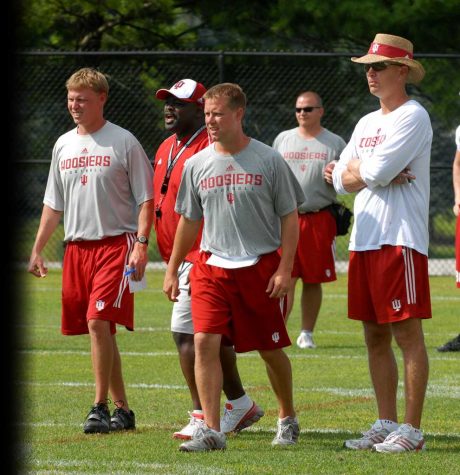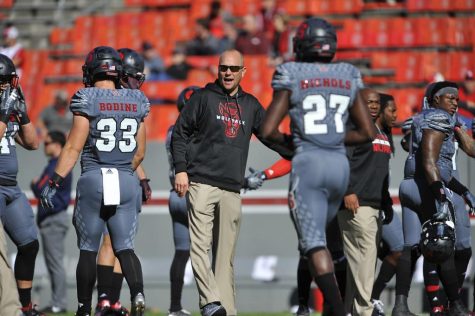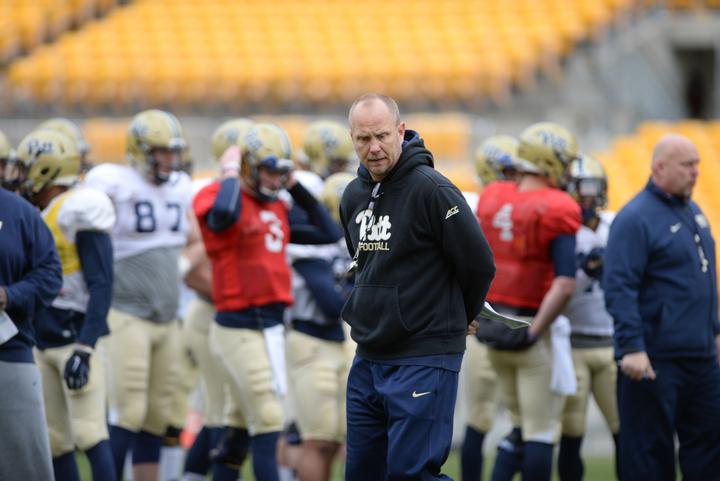It was 5:30 in the morning in 1996. Instead of sleeping, a then 23-year-old Matt Canada was hanging a banner for the Indianapolis 500 on a bridge on 16th Street in the city.
He was serving as Butler University’s quarterbacks and wide receivers coach at the time, sometimes doing odd-jobs to supplement his $5,000 salary — “part-time money for a full-time coach,” as he described it. As he and two other men struggled to hang the banner, he started to question his employment decision.
“You’re over here trying to tie this Budweiser race sign up, and you’re kind of wondering, ‘what I am doing here,’” Canada said.
Through his grogginess, Canada remembered why.
Canada has always wanted to teach, even when he was getting offers to play college ball. Before coming to Pitt as offensive coordinator and quarterbacks coach under head coach Pat Narduzzi, Canada picked up opportunities wherever he could, snowballing his learning experiences into a coaching style peppered with influences from multiple mentors.
“When you’re able to have a job that you enjoy, you’ve got to fight to have that,” Canada said.
It’s that passion that enabled him to start off as a student assistant at Indiana in 1992 before eventually working his way up through five other schools to become an offensive coordinator at Pitt. Ken LaRose, Canada’s head coach at Butler, foresaw Canada’s rise early on.
“I’m not surprised by all the success he’s had,” LaRose said. “I knew that he’d go a long way.”

Working his way up
Growing up playing football and basketball, Canada enjoyed the strategic parts of the games; playing professionally wasn’t really his dream.
He played football in high school, and Indiana recruited him, but a knee injury destroyed his chances at playing college football. Still, Canada wasn’t all that upset.
“I was an average player. It wasn’t like it was any kind of travesty,” Canada said.
He still chose Indiana University, but as a student pursuing a finance career rather than an athlete. By his sophomore year, Canada was thriving in school when Bill Mallory, Indiana’s head football coach, contacted him to join his staff as a student assistant.
Mallory remembered recruiting Canada and recalled his aspirations to be a coach. After the maximum number of graduate assistants a coach could have dropped from five to two, he was in need of some extra help. Mallory offered him the position, and Canada accepted.
Working with the quarterbacks and running backs was time consuming but valuable — Canada essentially did the work of a graduate assistant.
“I was in the press box every game, I was in meetings,” Canada said. “I was able to learn how to coach at a much earlier age, and it really has paid benefits for me.”
After graduating from Indiana, Canada got his master’s and worked as a graduate assistant at Indiana for two years, where he got a scholarship to complete his education. Once he was done there, LaRose offered him a job at Butler coaching quarterbacks and wide receivers.
For some of his success, Canada can thank his injured knee.
“Things worked out for me,” Canada said. “If I would have been a down-the-line quarterback, I would have never learned as much as I did.”
At Butler, Canada moved beyond the double duty work of taking classes and working full time for the team. He focused on one thing: developing his coaching style.
He learned to “settle into himself,” advice he got from Ott Hurrle, Butler’s defensive coordinator at the time. A self-described energetic coach, Canada said he tried too hard to fit in with the rest of the coaching staff.
“He told me to coach to my personality, don’t be somebody you’re not, because I was trying to make sure I wasn’t doing something different than what they want,” Canada said.
Perhaps most importantly, Canada learned how to recruit. Butler only offered partial scholarships at the time, so players had to pay some of their way through college if they chose to attend.
When Narduzzi hired Canada, he called him a “strong recruiter and evaluator.” At Butler, LaRose said, a coach had to be skilled at both — especially when they told prospective Butler parents the tuition cost.
“They would get, like, sticker shock,” LaRose said.
When Phil Dorn — Butler’s offensive coordinator — left to take another job in 1997, LaRose gave Canada a call and asked him to meet at McDonald’s. Over coffee, the two started talking.
“I said, ‘well, you ready to take over the offense?’ And his eyes lit up,’” LaRose said. “He said, ‘I’m ready, let’s go.’”
Butler went 6-4 in Canada’s first year in the position. A typically losing program, it was a win total that Butler did not match again until 2008.
Canada’s work attracted Joe Novak’s attention at Northern Illinois, so after just one year as offensive coordinator at Butler, Canada moved on again.
“I knew we were going to lose him at some point because he was young and eager and working his way up,” LaRose said
”You can teach anything”
Novak knew Canada, as he was an assistant at Indiana during Canada’s stints as a graduate assistant and a student assistant. Novak needed a running backs coach — though Canada had never played the position, he thought back to advice he’d picked up at Indiana.
“Coach Mallory’s philosophy was that coaches are teachers, and you can teach anything,” Canada said.
So Canada worked the position for two years, until Novak made him the quarterbacks coach. After a year serving that job, he upgraded to the offensive coordinator and quarterbacks coach in 2003.
Canada ran a spread offense with a run focus, as opposed to the pro style he ran at Butler. Leading the way in Canada’s offense was future NFL running back Michael Turner, who Canada recruited when he was a running backs coach. The team went 10-2, a significant improvement from the 2-9 record Canada’s first year at Northern Illinois.
Canada joined a league of experienced coaches. There was Scott Shafer, who went on to be the head coach at Syracuse, Mike Priefer, the special teams coordinator for the Minnesota Vikings, and of course, Narduzzi, Pitt’s head coach.
Novak, according to Canada, taught him to make a plan and stick to it.
“It was a great, great group of coaches,” Canada said. “We were all young and dumb and didn’t know much, but we worked really hard, and Coach Novak really coached us.”
Returning to Indiana
When Canada had the chance to come full circle and return to Indiana in 2004, he took it. He said the allure of coaching at his alma mater pulled him back.
Canada came back to his home turf armed with a new set of experiences. Indiana offensive coordinator and eventual head coach Bill Lynch fast-tracked him from quarterbacks coach to passing game coordinator to offensive coordinator, which Lynch said was a “no-brainer.”
Canada again ran a spread offense. From 2007-2010, Canada’s offense produced three first team All-Big Ten receivers, an all-conference left tackle and an all-league quarterback.
“He was very creative. He did a really good job of mixing things up,” Lynch said. “Got us in some different personnel sets and formations that gave people in the Big Ten some problems.”
After the 2010 season, though, Indiana fired Lynch, and Canada had to find a new job. He returned back to Northern Illinois as an offensive coordinator and quarterbacks coach under head coach Dave Doeren. The team went 11-3, winning the MAC championship.
But Canada’s stay was short. He left after one year to take the same position at Wisconsin, a school he was familiar with having recruited in the state while at Northern Illinois, Canada revered the program, as he said it was similar to what he helped build at NIU.
“That was a place I always wanted to coach. That was kind of a destination school for me,” Canada said.
A year there, and then Gary Anderson took over and Canada was gone again, taking the same job at NC State under Doeren after Wisconsin head coach Bret Bielema left for Arkansas.
“That was a little bit unexpected to me. That wasn’t necessarily what the plan was, so I had to move again,” Canada said.
Though the moves were obvious for Canada, it was tough on his two children, Tori and Chris, who were in grade school and middle school age throughout.
“I think they’re better for it,” Canada said. “They’re certainly very personable people, they know how to meet people.”
After three years at NC State, though, Canada was fired. Canada said he was shocked, especially since he had directed a fairly good offense in his last year — 42nd in the country.
But he didn’t despair for long — Jim Chaney left Pitt for Georgia at the perfect moment for Canada to swoop in and fill Narduzzi’s needed coordinator spot.
Canada said the two had discussed the position the previous year but could not work out a deal due to Canada’s buyout. They share similar family values, Canada said, along with fiery personalities.
Plus, Canada had long talked with fellow NIU coaches — the young and “dumb” group of guys, including Narduzzi, who’d had fun together years prior — about eventually working together again.
“We thought someday we’d all get back together somewhere, somehow,” Canada said. “To work with somebody I know and trust, that was the draw.”

A Panther at Last
Canada’s long stay in college football has had its pitfalls. Offensive coordinators, he’s learned, are highly criticized and analyzed. This is the job he loves, but the voices are hard to ignore.
“Nobody likes people to think they’re not doing a good job,” Canada said. “You go up to the dentist, everybody’s not going to be there watching the dentist fill the cavity and talk about it, write about it and criticize it like, ‘he should’ve done this,’ or, ‘he put the Novocaine in the wrong spot.’”
Over the years, his offensive philosophy has changed. Most of all, he stressed that his offense fluctuates based on his personnel, pointing to the heavy use of tight ends at NC State one year and his running back dependent offense at Wisconsin in another.
“It’s a player’s game,” Canada said. “We’ve got to put our players in a position to make plays, and then they’ve got to make them.”
To Canada’s credit, Lynch praised his adaptability.
“I always thought he was really good at adjusting to the talent and type of players he was working with,” Lynch said.
From now until the start of the season, Canada will evaluate his offense’s strengths. It will be long, arduous work, having to teach a new offense to his team and then figure out which players stick out.
But Canada, who’s traveled a crisscrossed path to Pitt, wouldn’t have it any other way.
“I got my dream job, and a lot of people don’t get to do that,” Canada said.



